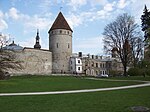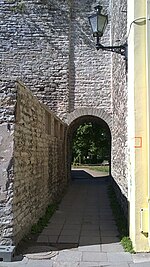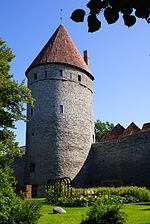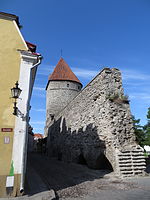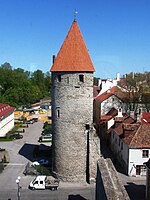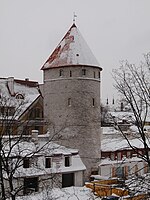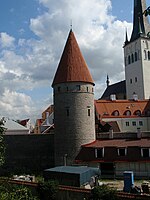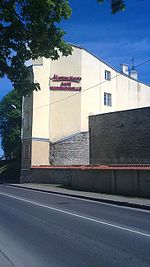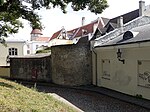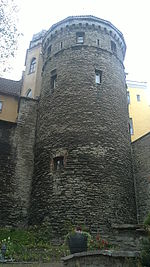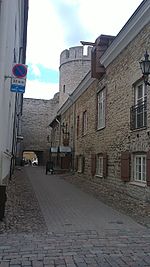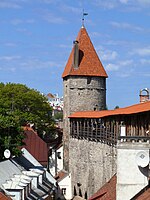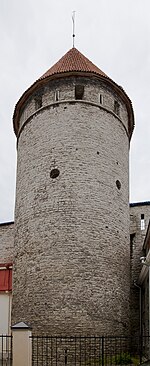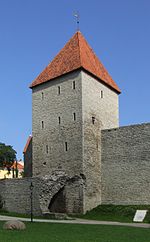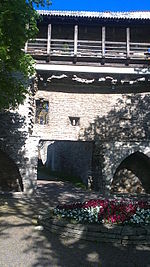Name Image Notes Location Coordinates Long Leg Gate TowerPika jala väravatorn ) Pikk jalg 59°26′15.87″N 24°44′34.33″E / 59.4377417°N 24.7428694°E / 59.4377417; 24.7428694 (Pika jala väravatorn ) Tower behind AlmshouseSeegitagune torn ) demolished in the 19th century Nunne 3 Tower behind SaunaSaunatagune torn ) partially extant Nunne 9 / Nunne 11A Nun's GateNunnavärav ) Demolished in 1868. Nunne Nun's TowerNunnatorn ) Väike-Kloostri 1 59°26′21.41″N 24°44′32.55″E / 59.4392806°N 24.7423750°E / 59.4392806; 24.7423750 (Nunnatorn ) Monastery GateKloostrivärav ) end of 19th century Suur-Kloostri 59°26′22.01″N 24°44′32.51″E / 59.4394472°N 24.7423639°E / 59.4394472; 24.7423639 (Kloostrivärav ) Sauna TowerSaunatorn ) Suur-Kloostri 18 59°26′22.63″N 24°44′32.49″E / 59.4396194°N 24.7423583°E / 59.4396194; 24.7423583 (Saunatorn ) Golden Leg TowerKuldjala torn ) Gümnaasiumi 1A 59°26′24.11″N 24°44′33.25″E / 59.4400306°N 24.7425694°E / 59.4400306; 24.7425694 (Kuldjala torn ) Tower behind NunsNunnadetagune torn ) Kooli 1 59°26′25.39″N 24°44′34.27″E / 59.4403861°N 24.7428528°E / 59.4403861; 24.7428528 (Nunnadetagune torn ) Loewenschede TowerLoewenschede torn ) Kooli 7 59°26′26.18″N 24°44′35.99″E / 59.4406056°N 24.7433306°E / 59.4406056; 24.7433306 (Loewenschede torn ) Lippe TowerLippe torn ) destroyed Kooli 9 passage beside Lippe Tower Built 1933 Laboratooriumi 21 59°26′26.5″N 24°44′38.85″E / 59.440694°N 24.7441250°E / 59.440694; 24.7441250 (passage ) Rope Hill TowerKöismäe torn ) Laboratooriumi 27 59°26′27.4″N 24°44′41.67″E / 59.440944°N 24.7449083°E / 59.440944; 24.7449083 (Köismäe torn ) breakthrough of Suurtüki street 19th century Suurtüki 59°26′28.24″N 24°44′43.48″E / 59.4411778°N 24.7454111°E / 59.4411778; 24.7454111 (breakthrough ) Plate TowerPlate torn ) Laboratooriumi 29 59°26′28.63″N 24°44′43.98″E / 59.4412861°N 24.7455500°E / 59.4412861; 24.7455500 (Plate torn ) Epping TowerEppingi torn ) Laboratooriumi 31 59°26′29.82″N 24°44′46.2″E / 59.4416167°N 24.746167°E / 59.4416167; 24.746167 (Eppingi torn ) Tower behind GrusbekeGrusbeke-tagune torn ) Laboratooriumi 33 59°26′31.22″N 24°44′48.62″E / 59.4420056°N 24.7468389°E / 59.4420056; 24.7468389 (Grusbeke-tagune torn ) Renten TowerRenteni torn ) lower part extant inside a later building Lai 49 Tower behind WulfardWulfardi-tagune torn ) lower part extant Tolli 4 59°26′32.3″N 24°44′53.97″E / 59.442306°N 24.7483250°E / 59.442306; 24.7483250 (Wulfgardi-tagune torn ) Great Coastal GateSuur Rannavärav ) Pikk 70 59°26′33.23″N 24°44′57.44″E / 59.4425639°N 24.7492889°E / 59.4425639; 24.7492889 (Suur Rannavärav ) Fat Margaret Paks Margareeta ) Pikk 70 59°26′33.3″N 24°44′58.72″E / 59.442583°N 24.7496444°E / 59.442583; 24.7496444 (Paks Margareeta ) Stolting TowerStoltingi torn ) Pikk 68 59°26′31.78″N 24°44′58.62″E / 59.4421611°N 24.7496167°E / 59.4421611; 24.7496167 (Stoltingi torn ) Tower behind HattorpeHattorpe-tagune torn ) Pikk 62 59°26′29.5″N 24°44′57.6″E / 59.441528°N 24.749333°E / 59.441528; 24.749333 (Hattorpe-tagune torn ) tower near the former Russian church destroyed Sulevimägi Small Coastal GateVäike Rannavärav ) destroyed Bremen TowerBremeni torn ) Vene 28 59°26′21.86″N 24°44′57″E / 59.4394056°N 24.74917°E / 59.4394056; 24.74917 (Bremeni torn ) Bremen PassageBremeni käik ) 19th century Bremeni käik 59°26′21.54″N 24°44′57.15″E / 59.4393167°N 24.7492083°E / 59.4393167; 24.7492083 (Bremeni käik ) Tower behind MonksMunkadetagune torn ) Müürivahe 58 59°26′18.46″N 24°44′58.89″E / 59.4384611°N 24.7496917°E / 59.4384611; 24.7496917 (Munkadetagune torn ) Helleman TowerHellemani torn ) Müürivahe 48 59°26′15.15″N 24°44′59.82″E / 59.4375417°N 24.7499500°E / 59.4375417; 24.7499500 (Hellemanni torn ) Viru GateViru värav ) Viru 59°26′11.87″N 24°45′1.31″E / 59.4366306°N 24.7503639°E / 59.4366306; 24.7503639 (Viru värav ) Hinke TowerHinke torn ) Pärnu mnt 2 / Müürivahe 32 59°26′9.55″N 24°44′57.98″E / 59.4359861°N 24.7494389°E / 59.4359861; 24.7494389 (Hinke torn ) Düvelsmoder Tower / Devil's Mother's TowerDüvelsmoderi torn / Kuradiema torn ) demolished in 1882 Väike-Karja/Müürivahe Lurenburg Artillery TowerLurenburgi suurtükitorn ) Built 1538–1554, demolished in 1767 during the expansion of the bastion systems. Pärnu mnt 7 Cattle GateKarjavärav ) Built 1456, demolished in 1849 to widen the streets. Was used to transport cattle between the city and pastures. Assauwe TowerAssauwe torn ) Müürivahe 12 59°26′5.61″N 24°44′43.33″E / 59.4348917°N 24.7453694°E / 59.4348917; 24.7453694 (Assauwe torn ) Harju GateHarju värav ) Mentioned in 1361, 1448–1453 the second front gate was built. In 1862 the front gates were demolished and in 1875 the main gate. Harju 59°26′4.74″N 24°44′37.53″E / 59.4346500°N 24.7437583°E / 59.4346500; 24.7437583 (Harju värav ) Goat TowerKitsetorn ) Rüütli Kiek in de Kök Komandandi tee 2 59°26′5.14″N 24°44′29″E / 59.4347611°N 24.74139°E / 59.4347611; 24.74139 (Kiek in de Kök ) Maiden's TowerNeitsitorn ) Lossi plats 11 / Lühike jalg 9A 59°26′6.8″N 24°44′27.51″E / 59.435222°N 24.7409750°E / 59.435222; 24.7409750 (Neitsitorn ) Stable TowerTallitorn ) Lossi plats 11 / Lühike jalg 9A 59°26′8.43″N 24°44′26.91″E / 59.4356750°N 24.7408083°E / 59.4356750; 24.7408083 (Tallitorn ) breakthrough from Toompea to Danish King's Garden Lühike jalg 59°26′8.9″N 24°44′27.14″E / 59.435806°N 24.7408722°E / 59.435806; 24.7408722 (breakthrough ) Short Leg Gate TowerLühikese jala väravatorn ) Lühike jalg 9 59°26′10.01″N 24°44′28.15″E / 59.4361139°N 24.7411528°E / 59.4361139; 24.7411528 (Lühikese jala väravatorn ) Dome GateToomvärav ) demolished in 1860. 






